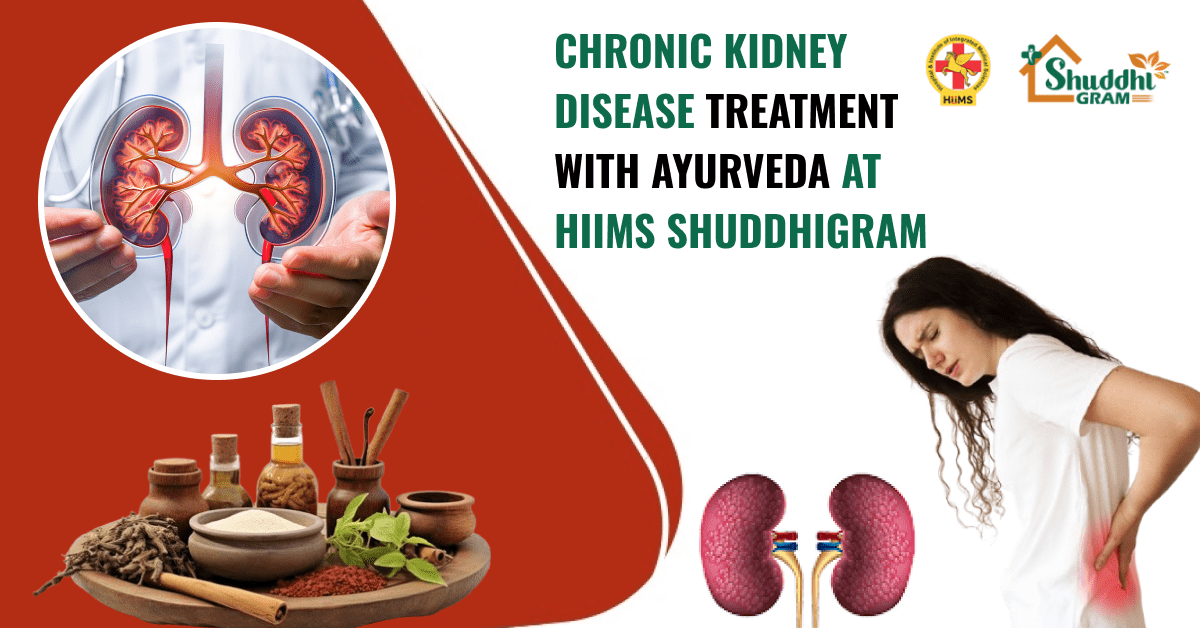
Chronic Kidney Disease (CKD) is often a silent and progressive condition that can severely impact quality of life. Most people come to know about it only when the damage has already advanced, leaving them with limited treatment options like dialysis or kidney transplant. But Ayurveda, the ancient Indian system of medicine, offers a ray of hope through holistic and non-invasive healing.
This blog explores how chronic kidney disease treatment through Ayurveda addresses not just the symptoms but also the root causes, providing a sustainable path to recovery. If you’re looking for an Ayurvedic hospital for kidney disease, keep reading to understand how natural therapies can help you regain your health.
Understanding Chronic Kidney Disease: More Than Just a Diagnosis
Kidneys are essential in removing toxins, regulating blood pressure, balancing electrolytes, and maintaining fluid levels. When kidney function begins to decline, toxic Waste builds in the body and causes a number of problems.
Common Causes of Kidney Disease:
- Prolonged use of painkillers or antibiotics
- High blood pressure or diabetes
- Dehydration and poor dietary habits
- Genetic predisposition
- Autoimmune disorders
These variables can gradually harm the nephrons, the functional units of the kidneys, making it difficult for them to filter blood adequately.
Symptoms That Should Not Be Ignored
CKD is often mistaken for general fatigue or weakness, which delays diagnosis. Recognizing early signs is critical for timely intervention:
- Swelling in legs, ankles, or around the eyes
- Persistent fatigue or tiredness
- Changes in urination pattern (frequency, color, or quantity)
- Nausea, vomiting, or poor appetite
- Difficulty concentrating and disturbed sleep
When such symptoms persist, it’s important to consider a kidney function test and seek treatment promptly.
Ayurveda: A Natural Approach to Chronic Kidney Disease Treatment
In contrast to conventional medicine, which tends to treat the symptoms of the kidneys or even advocate dialysis, Ayurveda seeks to treat and rejuvenate the kidneys more naturally. Some Ayurvedic hospitals for kidney disease in India have been at the frontiers of this holistic approach, providing integrated therapies to improve kidney function without invasive procedures.
1. Panchakarma Therapy – Detoxifying from Within
Panchakarma is one of the core components of Ayurvedic healing in chronic kidney disease treatment, a detoxification therapy meant to expel the nasty, deep-rooted toxins from the body. Panchakarma helps cleanse the body and is useful for dialing down the work for the kidneys, aiding their natural functioning.
Key Benefits:
- Clears toxins from blood and tissues
- Nurture metabolic activity
- Strengthens the urinary system
2. The GRAD System – Enhancing Circulation and Kidney Efficiency
At some advanced Ayurvedic hospitals for kidney disease, innovative natural therapies have been integrated with traditional practices. One such protocol is the , which combines multiple therapies like Head-Down Tilt Therapy and Hot Water Immersion Therapy to improve blood circulation and support kidney rejuvenation.
Head-Down Tilt (HDT) Therapy
This therapy involves tilting the body at a 5°–15° angle with the head lower than the feet. It increases blood flow toward the kidneys, which may help stimulate better filtration and waste elimination.
Therapeutic Benefits:
- Improves renal perfusion (blood supply to kidneys)
- Assists in fluid balance
- Reduces toxin buildup in the body
Hot Water Immersion (HWI) Therapy
This requires soaking for 30 to 40 minutes in water that has been heated to around 42°C. It helps in blood vessel expansion and improves the kidneys’ oxygen delivery.
Therapeutic Benefits:
- Stimulate detoxification through sweating
- Reduces muscular tension and stress
- Improves nutrient flow to the kidneys
3. The DIP Diet: Naturally Nourishing Your Body
Nutrition plays a significant role in Chronic Kidney Disease Treatment. The DIP Diet focuses on natural, plant-based foods that are easy to digest and light on the kidneys.
DIP Diet Guidelines:
- Breakfast: 3–5 seasonal fruits based on body weight, with a portion of homemade millet
- Lunch: Seasonal raw salads and a millet-based meal
- Dinner (before sunset): Either fruits and salads or a light soup with fruits and vegetables
Why it works:
- Eliminates processed foods, excess salt, and animal protein
- Rich in antioxidants and fibre
- Supports natural detox and digestion
4. Herbal Remedies – Healing from Nature’s Pharmacy
Ayurveda has long relied on herbs to heal and support organ functions. Kidney-specific herbs can improve urine production, reduce inflammation, and strengthen renal tissues.
Commonly Used Herbs:
- Punarnava: Reduces water retention and supports kidney detox
- Gokshura: Improves urinary flow and rejuvenates kidneys
- Varun: Known to prevent kidney stone formation and cleanse the urinary tract
These herbs are often prescribed in the form of powders, decoctions, or capsules under professional supervision.
Real Stories, Real Recovery
Thousands of patients have experienced relief and reversal of kidney symptoms through Ayurvedic therapy. From reducing creatinine levels to avoiding dialysis, their transformation shows how natural treatments can restore life and energy.
In one such case, a patient suffering from advanced CKD visited an Ayurvedic hospital for kidney disease with hopes of avoiding dialysis. Within a few months of following Panchakarma, GRAD therapy, and the DIP diet, his condition improved significantly. He not only got rid of dialysis but also returned to his regular routine with renewed energy.
Why Choose an Ayurvedic Hospital for Kidney Disease?
Many people ask why Ayurveda is emerging as a preferred treatment option. The answer lies in its balanced and individualized approach.
Key Advantages:
- No side effects than modern medications.
- Non-invasive and pain-free therapies.
- Instead of only focusing on symptom suppression, it is best to focus on the root cause.
- Affordable and sustainable treatment model.
- Combination therapies of diet, detox, etc and herbal care.
HIIMS Shuddhigram in Meerut is helping many people take care of their kidneys naturally, without the need for dialysis or surgery.
Conclusion
The road to recovery is as unique as any health journey. Beyond merely treating chronic kidney disease, Ayurveda provides an opportunity to re-establish equilibrium and a connection with the body’s inherent rhythm. It is feasible to manage renal health without fear or dependence if the proper advice, supporting therapies, and mindful living are received. At Hiims Shuddhigram in Meerut, this integrated approach isn’t just about improving lab reports, it’s about helping people feel stronger, live better, and find hope again.







No approved comments yet.